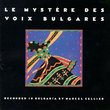| All Artists: Hans Hotter, Johannes Brahms, Herbert von Karajan, Vienna Philharmonic Orchestra, Elisabeth Schwarzkopf Title: Brahms: Ein deutsches Requiem Members Wishing: 0 Total Copies: 0 Label: EMI Classics Release Date: 3/23/2004 Album Type: Original recording remastered Genre: Classical Styles: Opera & Classical Vocal, Historical Periods, Early Music, Modern, 20th, & 21st Century, Symphonies Number of Discs: 1 SwapaCD Credits: 1 UPCs: 724356281226, 724356281257 |
Search - Hans Hotter, Johannes Brahms, Herbert von Karajan :: Brahms: Ein deutsches Requiem
 | Hans Hotter, Johannes Brahms, Herbert von Karajan Brahms: Ein deutsches Requiem Genre: Classical
|
Larger Image |
CD DetailsSimilarly Requested CDs
|
CD ReviewsCollectors Item Only- not for 21st century use Steven Welker | San Diego, CA United States | 04/02/2004 (2 out of 5 stars) "I have nothing against Brahms' Requiem. I have nothing against Karajan. What I am against is EMI's outer packaging which does not indicate whatsoever that this recording occurred in 1947 until you rip off the shrinkwrap and look in the insert. I'm sure the recording quality is magnificent by 1947 standards, but it is now a different millenium and digital remastering can only do so much. The The only reason I can see why EMI decided to release this recording is for connoisseurs who are not satisfied with Karajan's other recording(s?) of Ein Deutsches Requiem. I don't have much else to say. I feel duped and I write this only to warn others." Minus one star for concealing the age of the recording pm444 | Okemos, MI USA | 05/06/2004 (4 out of 5 stars) "First, this is a classic recording of the Brahms' "Requiem", recorded in 1947 in a Vienna that was still suffering the ravages of war. There is an urgency and sincerity in this performance that speaks to the listener across the years and leaves an indelible impression. The first EMI CD of this recording was in barely acceptable sound, with a great deal of surface noise and distortion in the loud passages. This remastering is a major improvement and allows one to fully enjoy the memorable performance without having to put up with the sonic distractions of the older remastering. However, as the two previous reviewers point out, it's truly shameful that EMI chose to conceal the age of this recording as well as the fact that it is in mono. The whole point of such a reissue is to offer a better version of an historical recording, and EMI's shady marketing tricks are an affront to the company's continuing program of remastering classic recordings, which they offer at reasonable prices. Granted, EMI has a tendency to overdo it when it comes to capitalizing on its back catalog (I've read that EMI remains financially solvent only because of profits from the countless Callas reissues that seem to appear almost daily). Nevertheless, EMI has been a pioneer in using new technology to restore old recordings, and in doing so, has provided a valuable service to lovers of classical music. It's unfortunate that they've tarnished their reputation with a needless ruse, thus alienating both new listeners and those of us who have enjoyed EMI recordings for many years." Sonic update of a moving historical document Santa Fe Listener | Santa Fe, NM USA | 02/19/2008 (5 out of 5 stars) "This 1947 recording is one of Karajan's greatest, and as an exponent of the German Requiem he had no peer on disc except for Klemperer. Here we hear incredible intensity and emotional force. It's as if the soul of postwar Europe was crying out to God, and it's our great good fortune that the sonics are miraculous. Every detail of the chorus and soloists comes through; although the orchestral texture isn't the clearest, it has great impact and solid (not bomy) bass without shrillness in the upper end. EMI is to be congratulated on its remastering job.
Schwarzkopf is radiant and beautiful in her one extended solo, but really it is Hans Hotter who reaches greatness here. His voice is totally firm and clear, and he expresses Brahms's Protestant fervency with complete commitment. It is impossible to overpraise this document of a turning pooint in postwar history and a musical monument that does full justice to a world desperate for peace. P.S. - I feel copelled to quote from Richard Osborne's touching review in The Gramophone: "The intonation of some members of the Singverein occasionally wavers--there was no heating in the hall and some probably had not seen a decent meal for a week--but Karajan and Legge were endlessly patient and Schwarzkopf herself stood in the midst of the sopranos in many of the takes to give them added confidence and surety. The result is an articulation of the text so tender, so sad, so telling that one is no longer listening to a performance of a piece of music but to a sublime meditation on sacred texts ..."" |

 Track Listings (7) - Disc #1
Track Listings (7) - Disc #1








